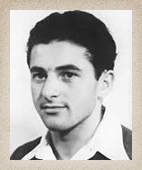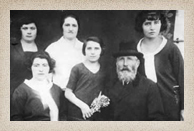
A Personal Recollection from Yosef Laufer
I was born in the year 1924 in the city of Zurawno, in western Ukraine. At one time this area was part of the East of Poland and situated within the district of Stanislawow.1 It had exchanged hands several times because of the upheavals that the two World Wars had brought.
When my father, Kalman Laufer, was born, Zurawno had a population of 3,000 people, of these, 2,000 and more were Jews. According to population survey documents of 1880, the Jews represented 70 percent of the population of the town. From this date, the demographic strength of the Jewish population declined in comparison to what it was in the time of my grandfather and my father.
Between the wars, economic difficulty and migration to large cities reduced the size of the general population of Zurawno to 2,000 people. The size of the Jewish population declined more dramatically and it lost its majority status-though its influence on the community at large was still marked. Between 1920 and 1930, the Jewish population numbered 1,000 people, which at times represented 50 percent of the total population of the town, but sometimes less than this.
I was the third and youngest child of Kalman and Leah Laufer. Their first-born, my brother Haim, was five years older than I; my brother, Yakov was two years my senior. I can remember that the clothes I wore as a child were always hand-me-downs from my older brothers, clothes that had become too small for them to wear. I accepted this as the natural order of things and can never remember even pausing to think about the matter.
Zurawno was a small town that possessed one main dirt road that led to it, and a few side roads. The town had not been connected to an electricity system nor was there piped water. This was brought in buckets from the wells.
My father was born in 1888. In better times, he bought and sold animals, and when he had to, was a property broker. When he married my mother in his young years, he moved to Zurawno from the village of Lubsza. This was a small village within our District. My father was the son of farmers. Grandfather Dov Laufer had a dairy and a plot of land on which he grew potatoes-these provided their livelihood. My paternal grandmother gave birth to eighteen children, of whom only eleven survived the illnesses of childhood. She died at the age of forty-eight, when the last born of her children were still very young.
My mother was born in 1895 and she too was from a rural Jewish family. She was the daughter of Samuel Diamant, an innkeeper who sold wines and spirits. They moved to Zurawno from Smochow, another small village in our district. She had two sisters and a brother, a family that would have been thought of at the time as small. The families of my grandparents were never well off; most of their energies were given to ensuring their economic survival. In spite of this fact and perhaps because of it, they were both united families. When any one member of the family had a problem, the rest of the family concerned itself with the matter: solutions were offered and advice was given to the family member who found himself in trouble of any kind.
Photo: Yosef Laufer in the year following World War II.
Reprinted from The Fields of Ukraine: A 17-Year-Old's Survival of Nazi Occupation; The Story of Yosef Laufer by Haim Tal (Dallci Press 2009), with permission granted by Dallci Press on March 28, 2010.

